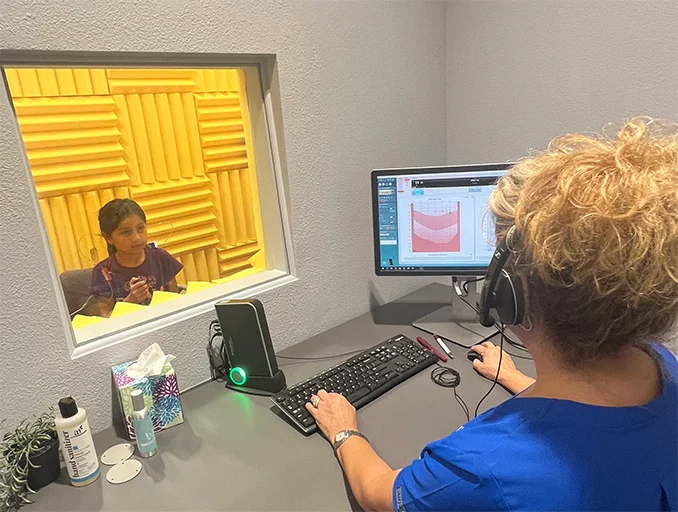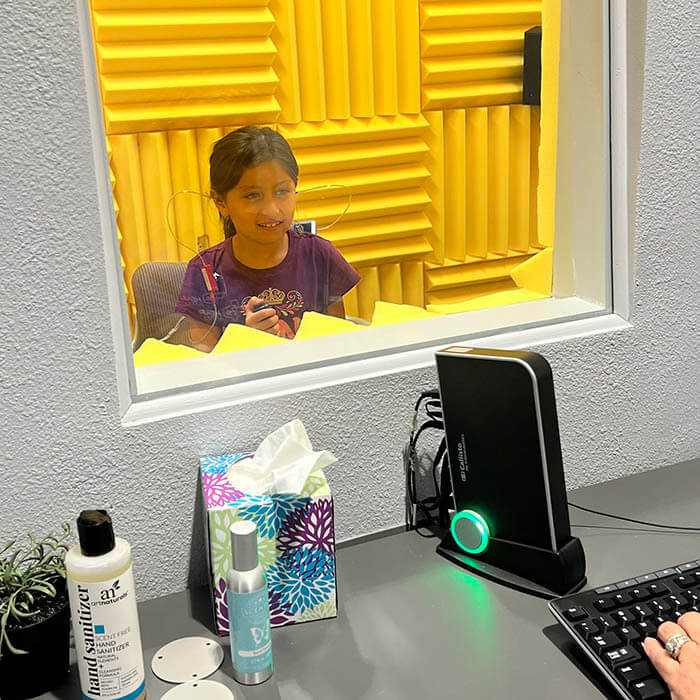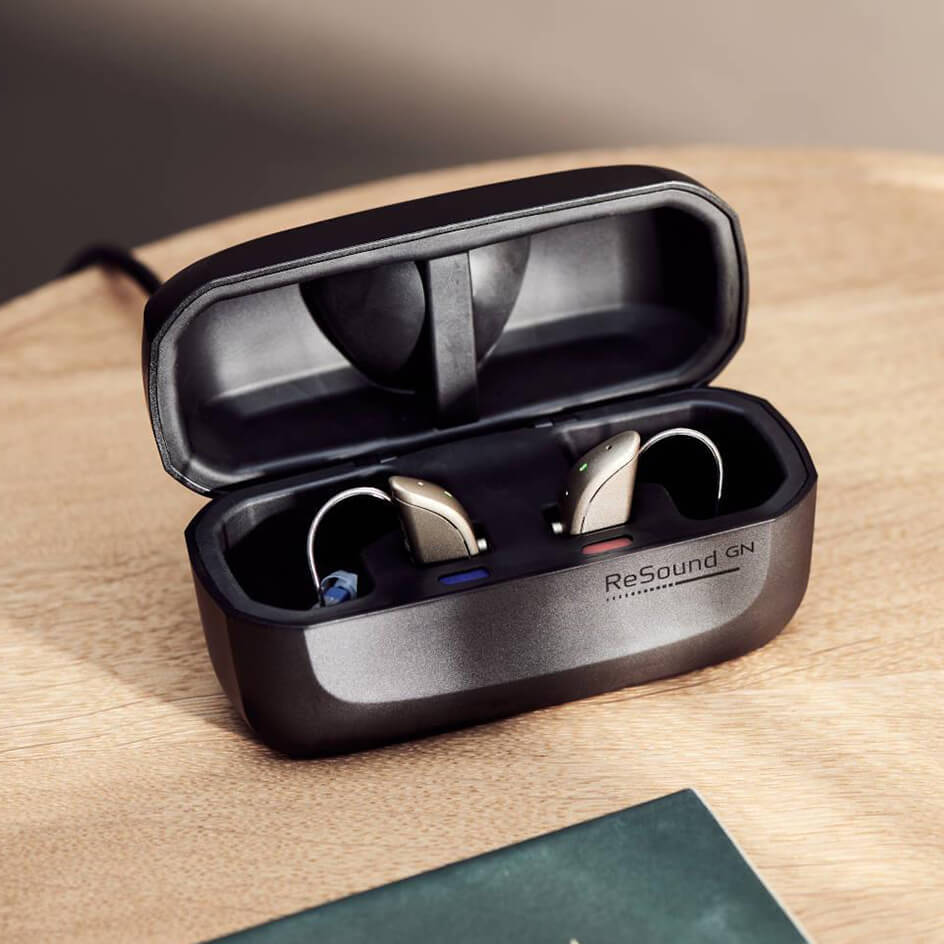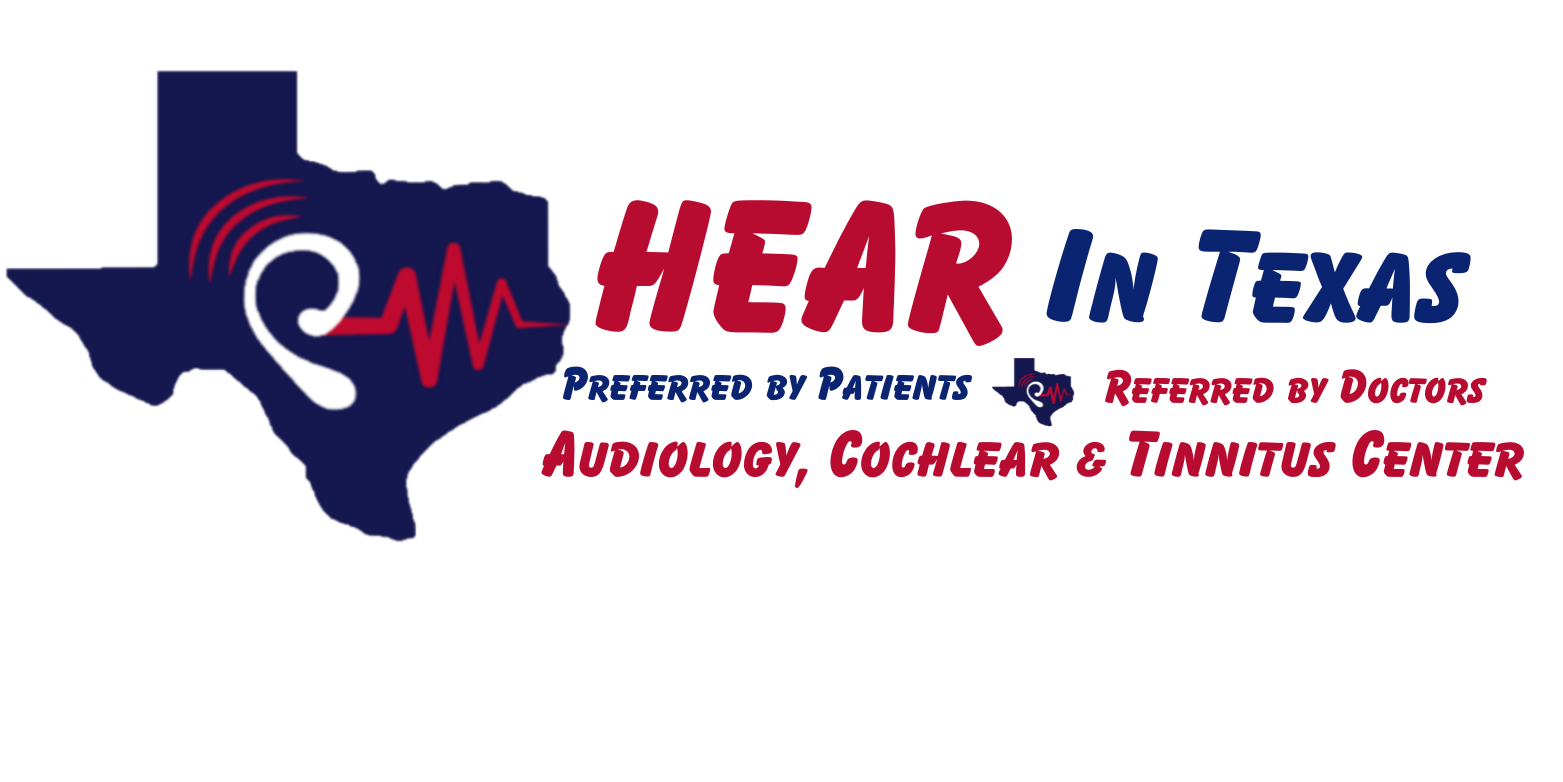HEAR IN TEXAS
Pediatrics
See an Audiologist trained in pediatrics for your child's hearing in New Braunfels, TX for Your Child’s Hearing

We more or less expect an elderly person to experience hearing loss due to age deterioration, but hearing loss can affect children with devastating developmental consequences.
As parents, we understand that nothing is more important than the healthy growth and development of your child.
When you suspect that your child is not hearing well, struggling to communicate, or lacking in language development, you will want to start looking for professional answers from a local pediatric audiologist capable of providing an accurate diagnosis and proper treatment for your child.
Every step of the pediatric hearing test used by Dr. Sally is designed to be friendly, welcoming, and relaxing for you and your child. Her approach to hearing tests for kids leads to more accurate testing results, which lead to the best possible solutions.
The pediatric audiology service offered by our pediatric hearing specialist at Hear in Texas includes newborn hearing screenings, children’s hearing exams, hearing aids for children of all ages, hearing aid fittings, rehabilitative services, and speech therapy.

What are the Common Causes
of Hearing Loss in Children?
01. Otitis Media
Otitis media is the most common cause of hearing loss in children. It involves inflammation of the middle ear, just behind the eardrum and often into the Eustachian tube between the middle ear and the back of the throat.
Because it is smaller and less angled in children than it is in adults, the Eustachian is easily blocked, leading to the fluid buildup that can cause “conductive” hearing loss. Infectious otitis media is often easier to detect since an earache and fever are often involved.
Seeking treatment for otitis media as early as possible, which sometimes includes the insertion of tubes to help with drainage, helps prevent permanent damage to your child’s hearing.
02. Congenital Hearing Loss
At around 16 weeks in the womb, most fetuses have already developed their hearing, but some people are born with hearing difficulties or “congenital” hearing loss. Genetic conditions account for 50% or more of congenital hearing loss cases.
Additional causes of congenital hearing loss can include prenatal infections, illnesses, and toxins consumed by the mother during pregnancy, along with an infection within the womb, premature birth, gestational diabetes, toxemia during pregnancy, and a lack of oxygen (anoxia).
Newborn hearing screenings help identify congenital hearing loss early on, making it possible to limit the effects of hearing loss and maximize auditory function for children with hearing loss.
03. Acquired Hearing Loss
Hearing impairments that show up after birth are referred to as acquired hearing loss, which is not child specific. Risk factors include frequent ear infections, ototoxic drugs known to affect hearing, meningitis, measles, encephalitis, chickenpox, influenza, mumps, head injuries, and frequent or ongoing exposure to loud noise.
Because noise-induced hearing loss (NIHL) is among the primary causes of acquired hearing loss in children, it deserves special attention. Headphones and earbuds used to play video games, and an endless stream of media via smartphones, have the capacity to pump damaging sound at excessive volume directly into your child’s ears.
Preventing acquired hearing loss involves monitoring the volume on your child’s earphones and earbuds as well as ensuring that your child wears hearing protection when exposed to noise from lawn and garden equipment, concerts and sporting events, motorcycles, and snowmobiles, or while participating in shooting sports or hunting.

When should your child should see an audiologist?

Are you aware of the warning signs of hearing loss? Knowing the signs and symptoms of hearing loss in children is critical for early diagnosis and treatment, because it gives our pediatric audiologist a fighting chance to reduce the impact of hearing loss on the healthy growth and development of your child.
To help evaluate whether your child is experiencing hearing loss, you can ask the following questions:
• Does your child get frequent colds and ear infections?
• Does your child not understand people without facing them?
• Does your child speak loudly, as if having trouble hearing himself/herself?
• Does your child always turn up the volume on the TV or radio?
• Does your child often not respond when called?
• Does your child need to have things repeated?
Is there a history of hearing loss in your family?
• Was your child born prematurely? (sooner than 37 weeks)
• Did your child have a low birth weight?
• Did your child experience a lack of oxygen at birth?
Difficulties with speech and language, impaired social emotional development, and reduced academic performance are among the consequences of hearing loss in children, so answering yes to any or several of these questions could indicate that your child could be at risk.
Contact Hear In Texas for your child's hearing evaluation.
Helping You to Choose the Right Hearing Technology through our Partnerships with all Manufacturers
With each level of hearing loss and person that we help having their own unique set of circumstances, there is never a “one size fits all” approach.
That’s why we partner with every hearing aid manufacturer to ensure that we can always find the right solution for your unique needs.
This also means that we’re often front of the queue to get our hands on the latest hearing technology to ensure that you always have access to the latest developments.

Schedule a Pediatric Hearing Test for Your Child
Nothing is more important than your child’s healthy growth and development, and hearing loss has a major negative effect on language development.
Pediatric hearing tests are essential for diagnosing the severity of your child’s hearing loss and starting the treatment to limit its impact.
Dr. Sally at Hear in Texas provides hearing and audiological services for infants and children of all ages. To schedule a pediatric hearing test for your child, submit the adjacent form and a member of our team will assist you with setting an appointment.
Hearing Health Resources
Latest News

Four Ways to Optimize Your Hearing in 2025
Your hearing health is a cornerstone of your overall well-being. Staying informed about the latest advancements in audiology can help you make empowered decisions about your hearing care.
Optimizing your hearing in2025requires a comprehensive strategy that includes regular assessments, embracing new technologies, exploring advanced interventions like cochlear implants, and keeping an eye on cognitive health.
You’re in the right place – our team of experts is committed to providing you with personalized care that adapts to your evolving needs.
1.Comprehensive Hearing Tests
Understanding your auditory profile starts with acomprehensive hearing test, offering an in-depth look into your auditory capabilities.
Using state-of-the-art diagnostic equipment, these tests precisely measure the degree and type of hearing loss you might be experiencing, which serves as the foundation for crafting your tailored hearing care plan.
You can rest assured that our team of hearing care experts will guide you through your results, making sure you understand every aspect of your hearing condition so you can make proactive decisions that enhance your hearing health.
2.Advanced Hearing Aid Technology
The evolution of hearing aidsover recent years has been remarkable. These aren’t the cumbersome devices of the past; today’s hearing aids are sleek, connected, and come equipped with features such as Bluetooth streaming, rechargeable batteries, and adaptive sound environments.
Key advancements include machine learning capabilities that learn and adapt to your personal sound environments, providing seamless sound quality regardless of where you are.
This technology, partnered with expert advice and recommendations from your hearing care provider, empowers you to engage fully in social situations, keep professional connections, and enjoy personal leisure with greater ease and comfort.
3.Cochlear Implants
For individuals with a profound hearing loss, traditional hearing aids might fall short.Cochlear implantsoffer an innovative solution, bypassing damaged portions of the ear to directly stimulate the auditory nerve, offering a new auditory experience for those with severe hearing impairment.
The process includes a surgical procedure followed by extensive auditory training and rehabilitation. At Hear in Texas, you can rely on our support through each step of this journey, from the first consultation to post-implantation care, ensuring that you achieve optimal hearing results.
4.Cognitive Screenings
The connection between hearing and cognitive health is well-documented, and maintaining cognitive function is an essential part of overall health.
Regular cognitive screeningsare designed to detect early signs of cognitive decline, which hearing loss can accelerate; by providing a comprehensive understanding of how your auditory system might affect cognitive function, you can enhance your quality of life and mental well-being.
Addressing these aspects synergistically helps prevent potential secondary effects of hearing loss like social withdrawal and depression.
Start Your Hearing Health Journey
It’s never too late to start a journey, especially one as important as your hearing health!
You’re not just a patient to us; you are a valued part of our commitment to advancing hearing health.
Together, you can rely on us to help you navigate the complexities of hearing care, ensuring you enjoy the clarity and richness of sound that you deserve.
Request a callbackto get started with our team today or give us a call at(830) 360-2000.
© Copyright 2025 Hear in Texas. All Rights Reserved. Designed by Topline




